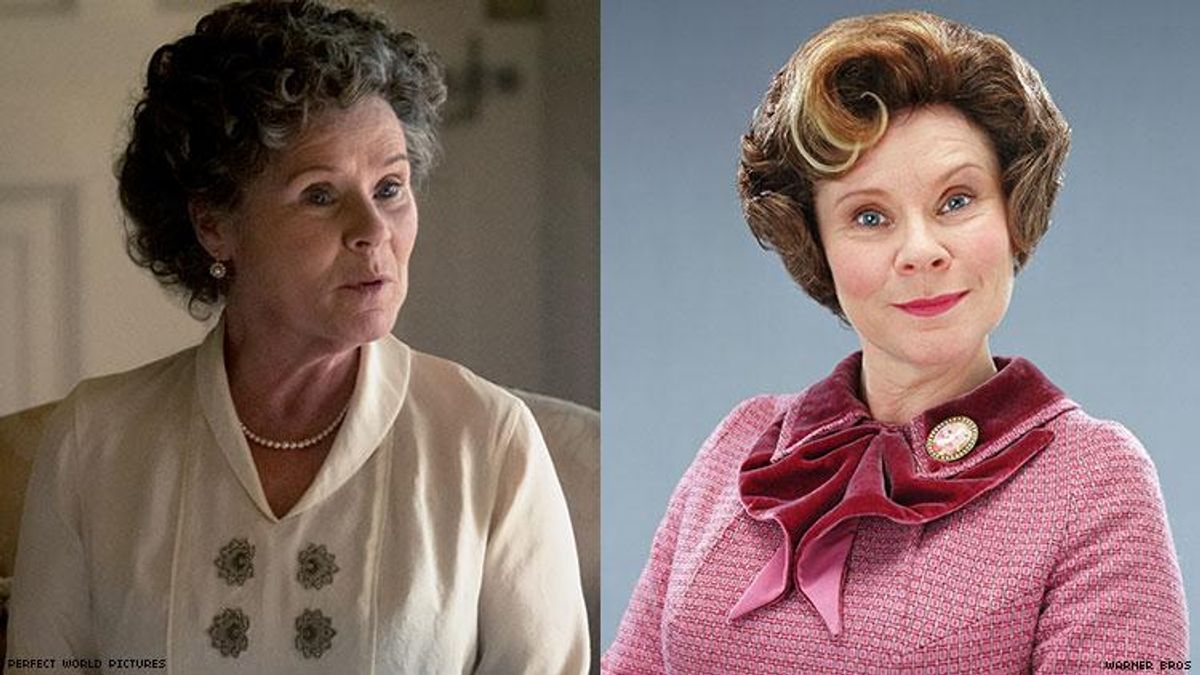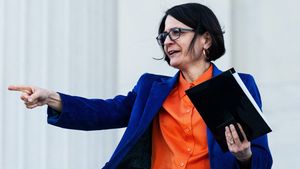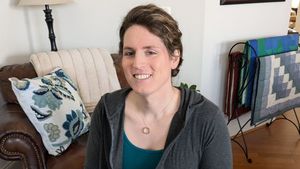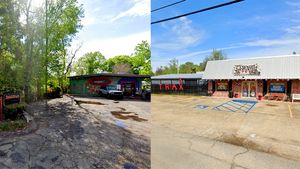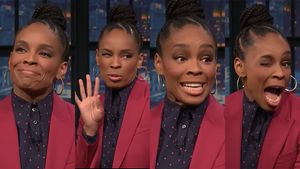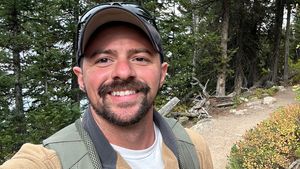Imelda Staunton is tiny. For a woman who has commanded thousands onstage as Gypsy's Mama Rose and terrified millions of children as Harry Potter's Professors Umbridge, it's shocking that Staunton -- with that deceptively mellifluous voice, one that hardens to steel between one breath and the next -- could be so small. That's so much talent packed into one woman.
Staunton returns to the screen Friday in Downton Abbey, the long-awaited big screen adaptation of the British period drama that took the world by storm. On a show that so clearly defines the divide between the gentility and the help, Staunton's character falls somewhere in the middle. Lady Maud Bagshaw is a lady in waiting to the queen, who comes to Downton for a royal visit, but she's also part of the Grantham clan (everyone is related in the British aristocracy) and soon becomes embroiled in the kind of sharp-tongued family squabble that has defined Downton Abbey since it began in 2011.
Staunton has always been connected to Downton Abbey -- her husband, Jim Carter, plays Carson, the Crawley family butler. For years, their family has watched Downton together on Sunday nights. "That's the traditional Sunday night fare: relaxing, nothing too challenging, thank you," Staunton says. "Lovely things to look at and good characters." The big-screen version of Downton is similarly low-stakes, high-gloss escapism -- which Staunton says is what audiences are yearning for. "You're not going to do something terrible in the film with any of the characters. Downton Abbey is not a documentary. Don't we need a film that is just letting people escape for a couple of hours in this present climate?"
Out spoke with Staunton about joining the Downton Abbey cinematic universe, the deliciousness of playing a character as evil as Dolores Umbridge, and what it's like to face off against Maggie Smith again.
It's interesting that you mention escapism as there's been an ongoing conversation about the film, saying it's escapism at a time, particularly in the U.K., when maybe people shouldn't be escaping. There was a review that called it Brexit propaganda. What do you think of that?
I don't think you can, in any way, put a political slant on this film at all. I just feel it's given people a couple of hours of respite.
Is that why people continue to findDownton Abbey so captivating?
In England, we live and thrive on our cynicism. And Americans, maybe foolishly, think that's how English people live still. There might be a few people [still living] like that, but on the whole, we ain't like that. It's historical light. It's giving people a time where maybe they want people who have values, like I think Carson, particularly, is a man of great honor. Things have to be done right and for the right reasons. And I think people really warmed to that and they [know] Carson, he'll make it all right. He'll make sure that things are done right and well, without exploiting anyone. He's the head of downstairs and Lord Grantham's the head of upstairs. And they both have responsibilities and they both work very hard at carrying out their duties. And I think people respond to people who take responsibility for their actions.
Your character's main storyline involves a secret about her maid, Lucy. Before the truth was revealed, I started to think, "Are they lovers?"
I did, too, when I started reading it.
Was that an intentional red herring?
I have no idea. It's jolly interesting if it is. Yeah, I thought that. I thought, "Oh, gosh, that would be, that's amazing." I think that's great that we just leave it like that, that something, "Oh, is she a ... oh, no. Right, OK."
Downton Abbey reunites you with Maggie Smith, and the two of you go toe-to-toe a few times. What are those scenes like to shoot?
I was delighted that I was upstairs because I could have so easily have been downstairs. And upstairs I had scenes with her and Penelope Wilton, so it was gorgeous to do those things because you want a bit of oomph. Maggie gets all those lines because she's the only person who can say them. You can give me those lines, they won't come out anything like Maggie says them, so it's great to play opposite that.
Dame Maggie and Dame Penelope both grew up doing plays and performing great writing. And the richness of that language has lasted all those years. So Maggie is used to saying the best lines ever, whether it's Noel Coward, whether it's Ibsen, whether it's Shakespeare, and Penelope also. So when you get a script like this, and actually their parts are so well-written that it's so easily delivered, because they've done it for so long and they know how to make those lines work. I think the difference between American actresses and English actresses, our history is theater and America's history is film. I think it's just different, not one is better than the other -- it's just different.
Of course, we have to talk about Harry Potter. What is it like to be part of that world and to be so well...
Hated.
Yes. What's it's like to be maybe best known for playing someone so vile?
Great. It's so much fun because it's got such muscle, a part like that. And I have to say, because I came in with the fifth film and that was the first [Potter] for director David Yates [who went on to direct the rest of the films in the series]. And we both came in as the new guys. But we had very good conversations, him and I, about the seriousness of this woman and about how dangerous she is to be in charge of children. It was the ultimate nightmare of having someone like that who is really, really interested in ethnic cleansing, which is what she's interested in. Pure blood. It's horrible. Anyway, but to play it, you have to sort of ... we were thinking of having to compare with terrible atrocities and Margaret Thatcher. These people who absolutely believe they are doing the right thing.
So it's not like, "I am evil, and I'm going to do ... ," and that's so much more frightening. That someone who's so pleasant would, metaphorically, stab you in the heart as many times as she needed to.
There's plenty of backstabbing at Downton Abbey. Would Umbridge fit in there?
I think she'd give them a run for their money, yeah. I think she'd clean things up a bit. Yes, she could go in and, yeah, make some waves. Because actually, if you think about, I think, Lord Grantham [Hugh Bonneville] and Carson, those two heads, are good people. They're locked in some weird world, but within that world, they're trying to do the best they can, whereas [Umbridge] just wanted her own way and to hell with consequences. And Grantham and Carson think about consequences, and I think that's the difference between good and bad.
As you said, you cut your teeth in theater and are an icon of contemporary musical icon specifically. Your Gypsy is so incredible.
You didn't see it, did you?
I didn't see it. I have watched a lot of YouTube videos. Any plans for returning to musicals, is that something you'd like to do?
There might be something, but I can't say.
Are there any roles out there that you're dying to play?
I've never been like that.
Really?
No, because I've always liked new writing in the theater. Maybe that might just be a little fearful, something in me saying, "Well, I can't do that because those who did it really well," but then I think, "Well, look, I did Sweeney Todd, I did Gypsy, I did Who's Afraid of Virginia Woolf." I have stepped into big shoes, and it was fun. But with plays, I've always liked new writing, so, no, there aren't the big theater parts that I've wanted to do or that I haven't done. I feel so lucky that I had something like Vera Drake, which altered things for me. I wouldn't have got Harry Potter without the success in Vera Drake. They might have wanted me in it, but my profile wasn't high enough. So then Vera Drake [made it] possible. Then, also, I don't like going away very much to work. I want to be at home and do my job. And I think we're a bit lucky in London because, well, in England, because I can do radio, television, film, and theater. I can do all those things and go home at night. I don't want to go away. Jim and I, we don't want to be apart like that for work because our life is more important.
Maybe a Downton Abbey musical?
Downton Abbey, the musical? Oh, God, no, no, and a thousand times no.
I'd buy a ticket.
Well, you didn't buy a ticket to Gypsy, did you?
RELATED | Downton Abbey Trailer Hints at a Gay Romance for Thomas
